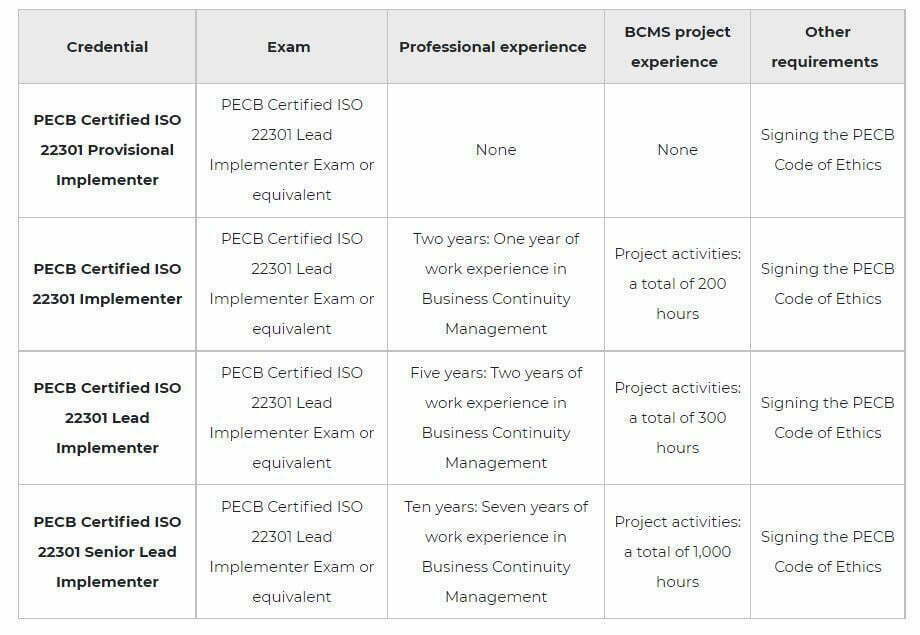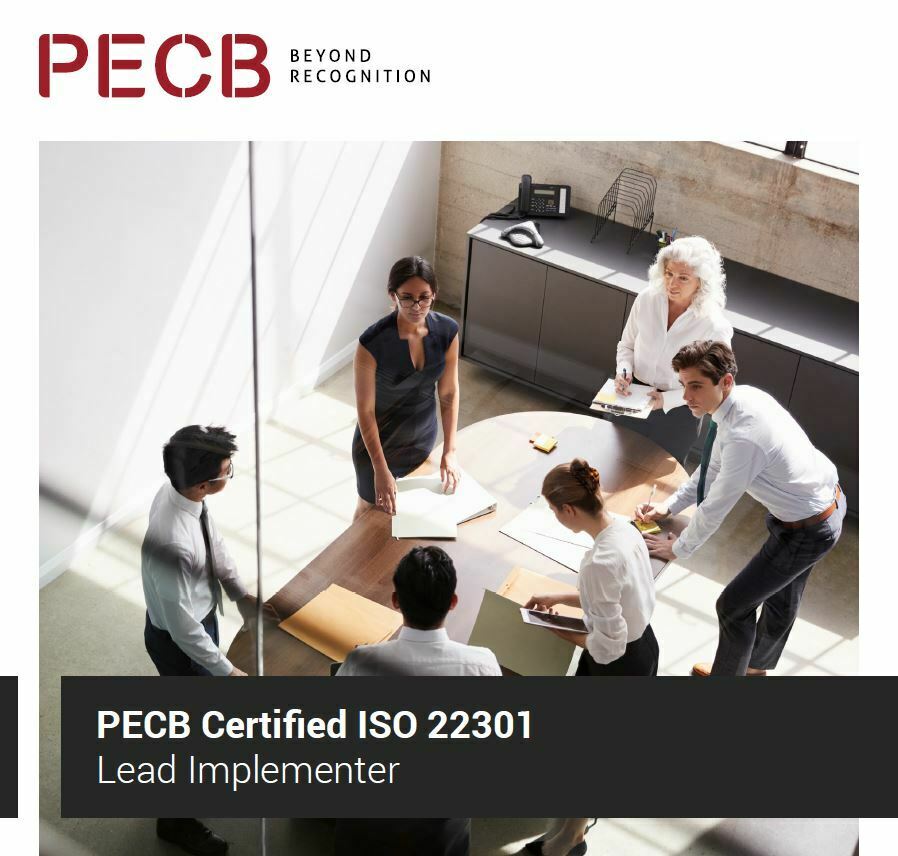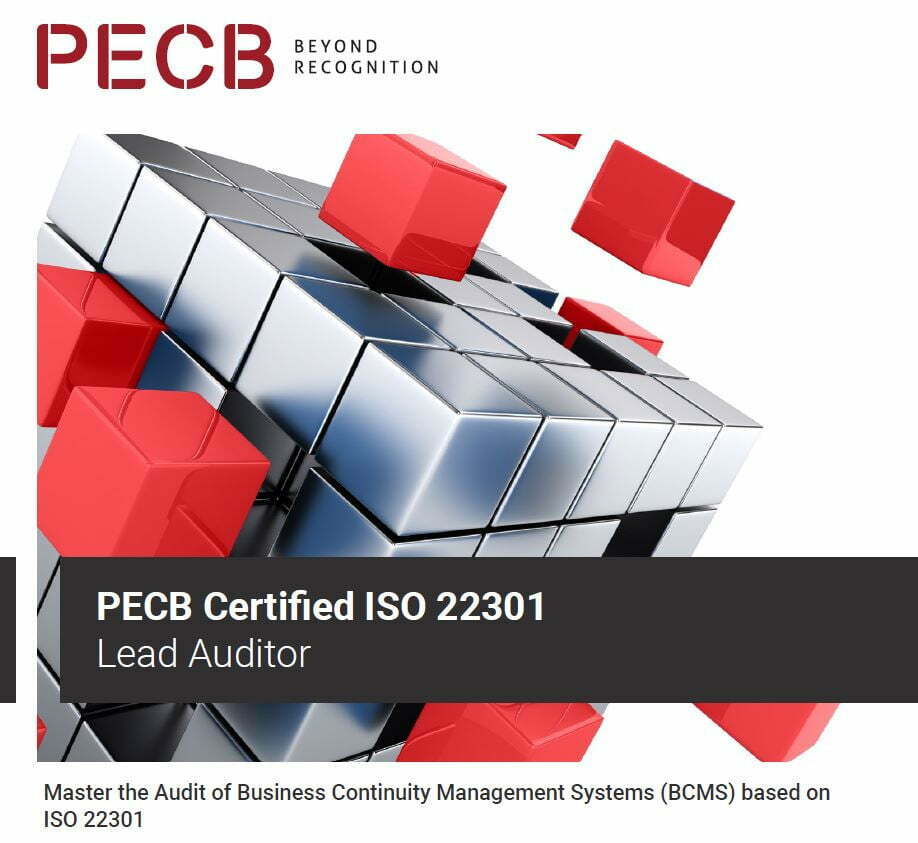TRAINING DAYS: 5
(4 days of training + 1 day exam)
CPD CERTIFICATION
31 Credits
EXAM DURATION
3 Hours
EXAM RETAKE POSSIBLE?
Yes. Free one more exam in 12 months
WHAT IS INCLUDED?
Training, PECB exam and certification
Why Should You Attend?
No two disasters in the world cause equal damage. Between the unpredictability of natural disasters, information security breaches, and incidents of different nature, preparedness can make you stand out in the crowd and predict the future of your business. In light of this, proper planning is essential to mitigating risks, avoiding consequences, coping with the negative effects of disasters and incidents, but at the same time, continuing your daily operations so that customer needs do not remain unfulfilled.
Organizations can make progress towards understanding and managing disasters, incidents, and risks by having a BCMS based on ISO 22301 in place. Therefore, PECB has designed this training course to prepare its participants implement a business continuity management system (BCMS) in compliance with the requirements of ISO 22301. Attending this training course allows you to gain a comprehensive understanding of the best practices of the business continuity management system and to be able to establish a framework that allows the organization to continue operating efficiently during disruptive events.
After attending the training course, you can sit for the exam and, if you successfully pass the exam, you can apply for the “PECB Certified ISO 22301 Lead Implementer” credential. The internationally recognized “PECB Certified ISO 22301 Lead Implementer” certificate will prove that you have the professional capabilities and practical knowledge to implement a BCMS based on the requirements of ISO 22301 in an organization.
Who Should Attend?
Learning objectives
This training course will help you:
Educational approach
Prerequisites
Participants who attend this training course are required to have a fundamental understanding of business continuity concepts and comprehensive knowledge of BCMS implementation principles.
Course Agenda
Day 1: Introduction to ISO 22301 and initiation of a BCMS
Day 2: Implementation plan of a BCMS
Day 3: Implementation of a BCMS
Day 4: BCMS monitoring, continual improvement, and preparation for the certification audit
Day 5: Certification exam
Examination
The “PECB Certified ISO 22301 Lead Implementer” exam complies with the PECB Examination and Certification Program (ECP) requirements. The exam covers the following competency domains:
Domain 1: Fundamental business continuity principles and concepts
Domain 2: Business continuity management system (BCMS) requirements
Domain 3: Planning a BCMS implementation based on ISO 22301
Domain 4: Implementing a BCMS based on ISO 22301
Domain 5: Performance evaluation and monitoring and measurement of a BCMS based on ISO 22301
Domain 6: Continual improvement of a BCMS based on ISO 22301
Domain 7: Preparing for a BCMS certification audit
General Information
1. Certification fees are included in the exam price.
2. Participants will be provided with the training material containing over 450 pages of explanatory information and practical examples.
3. An attestation of course completion worth 31 CPD (Continuing Professional Development) credits will be issued to participants who have attended the training course.
4. In case candidates fail the exam, they can retake the exam within 12 months following the initial exam for free.
Certification
After successfully passing the exam, you can apply for the credentials shown on the table below. You will receive a certificate once you comply with all the requirements related to the selected credential. For more information about ISO 22301 certifications and the PECB certification process, please refer to the Certification Rules and Policies.
The requirements for PECB Implementer Certifications are:

To be considered valid, these implementation activities should follow best implementation practices and include the following activities:
1. Drafting a BCMS plan
2. Initiating a BCMS implementation
3. Implementing a BCMS
4. Monitoring and managing a BCMS implementation
5. Continually improving a BCMS


